|
|
|
Sort Order |
|
|
|
Items / Page
|
|
|
|
|
|
|
| Srl | Item |
| 1 |
ID:
119485


|
|
|
|
|
| Publication |
2013.
|
| Summary/Abstract |
ASEAN's engagement with human rights is characterized by an action-identity gap; member states have created impressive regional commitments while continually violating rights domestically. This gap suggests that member states of ASEAN have used rights for political ends, the enhancement of ASEAN's legitimacy in the eyes of critics, not because they are understood as morally correct. The strategic use of norms indicates that existing recourse to constructivist accounts of norms in ASEAN, currently the dominant explanatory framework, is incorrect. This article argues that an alternative, rational choice, framework for appraising norms within ASEAN offers greater explanatory insight into how and why human rights emerged into ASEAN after 1997. This argument suggests a revised approach to understanding norm violation within ASEAN and through that a more accurate appraisal of the nature of contemporary ASEAN.
|
|
|
|
|
|
|
|
|
|
|
|
|
|
|
|
| 2 |
ID:
144531
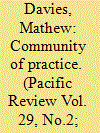

|
|
|
|
|
| Summary/Abstract |
Despite change in the aims, institutions and informal diplomacy of ASEAN since 1997, the formal diplomatic code of conduct remains locked in a traditionalist mode first outlined in the 1970s. Existing approaches from mainstream International Relations theorising are unable to adequately explain this continuity and change. The recent ‘practice turn’ in theorising offers distinct explanatory advantage, which this article illustrates by arguing that the formation of an ‘ASEAN rationality’ between 1967 and 1997 fundamentally curtailed the ability of regional diplomats to revise ASEAN post 1997, resulting in the coexistence of new and old norms in ASEAN's organisation design.
|
|
|
|
|
|
|
|
|
|
|
|
|
|
|
|
| 3 |
ID:
192076


|
|
|
|
|
| Summary/Abstract |
The COVID-19 pandemic poses fundamental challenges to the ways that the discipline of International Relations makes sense of our world. Framing the pandemic as both a social disaster and as part of an ongoing polycrisis, this work argues that existing responses to COVID-19 are, whatever their insights, partial and limited, predicated on assumptions about how we know the world now shown to be problematic. This situation calls less for some defined incremental change and more for a period of uncomfortable disciplinary reflection on the boundaries, purposes and value structures that shape IR.
|
|
|
|
|
|
|
|
|
|
|
|
|
|
|
|
| 4 |
ID:
123113
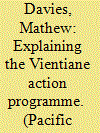

|
|
|
|
|
| Publication |
2013.
|
| Summary/Abstract |
Existing explanations for the emergence of human rights on the political agenda in ASEAN focus either on the role of external pressure on ASEAN member states to 'do something', or on the way those states copied the form, but not the function, of other regional organisations such as the EU. Both approaches tacitly acknowledge that given the strong preference for intergovernmental governance displayed by ASEAN, regardless of interpretations, that it was states that drove the institutionalisation of rights forwards. Through examining in detail the causes and consequences of the Vientiane Action Programme this article disagrees with that assertion. At crucial moments before and after 2004 it was the Working Group for the Establishment of an ASEAN Human Rights Mechanism, a track III actor, which both inserted human rights into ASEAN discussions and forged the link between protecting those rights and the continuing success of ASEAN's security goals. Through understanding the role of the Working Group as a norm entrepreneur, assisting in the localisation of human rights standards, this article suggests that existing explanations of ASEAN institutionalisation need to be revised to include a wider range of political dynamics than previously were acknowledged.
|
|
|
|
|
|
|
|
|
|
|
|
|
|
|
|
| 5 |
ID:
127075
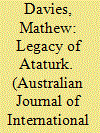

|
|
|
|
|
| Publication |
2013.
|
| Summary/Abstract |
There exists a significant and sustained difference between the ability of the European Union to successfully socialise those member states who have joined since the fall of Communism, and its apparent inability to similarly socialise Turkey. Despite some impressive legal and constitutional reforms since 2001, a key shortcoming remains, the unwillingness of many in the Turkish judiciary to implement those revised standards in a consistent way. Existing explanatory accounts of this inability would focus on the credibility of the Union offer of membership, the duration of negotiations or the importance of Turkish domestic standards. None of these, however, are able to account for why Turkey seems to occupy a half way position, exhibiting reformed laws but unreformed legal practice. To address this shortcoming this article shall combine existing scholarship on the importance of domestic normative contestation within Turkey with an appraisal of the shortcomings of the Union's conditionality policy itself that emerge from the conceptual studies of conditionality.
|
|
|
|
|
|
|
|
|
|
|
|
|
|
|
|
| 6 |
ID:
127073
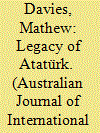

|
|
|
|
|
| Summary/Abstract |
There exists a significant and sustained difference between the ability of the European Union to successfully socialise those member states who have joined since the fall of Communism, and its apparent inability to similarly socialise Turkey. Despite some impressive legal and constitutional reforms since 2001, a key shortcoming remains, the unwillingness of many in the Turkish judiciary to implement those revised standards in a consistent way. Existing explanatory accounts of this inability would focus on the credibility of the Union offer of membership, the duration of negotiations or the importance of Turkish domestic standards. None of these, however, are able to account for why Turkey seems to occupy a half way position, exhibiting reformed laws but unreformed legal practice. To address this shortcoming this article shall combine existing scholarship on the importance of domestic normative contestation within Turkey with an appraisal of the shortcomings of the Union's conditionality policy itself that emerge from the conceptual studies of conditionality.
|
|
|
|
|
|
|
|
|
|
|
|
|
|
|
|
| 7 |
ID:
157730
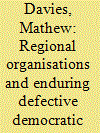

|
|
|
|
|
| Summary/Abstract |
Instead of asking whether regional organisations can promote democracy, a well-established conclusion, this article asks what type of democracy regional organisations can promote. Where their commitments to democracy are weak, regional organisations can promote the transition away from authoritarianism but cannot drive that process to completion with the creation of embedded liberal democracies. Under such circumstances regional organisations serve as regimes of bounded toleration, and can provide regional linkages that sustain defective democracies. Through examining the relationship between the Association of Southeast Asian Nations and Myanmar, three supporting roles are identified; regional legitimacy, defence from external pressure, and future-oriented accommodation. The presence of these linkages between defective democracies and regional organisations provides a caveat to the positive assessments of regional organisations as socialisers of democracy.
|
|
|
|
|
|
|
|
|
|
|
|
|
|
|
|
| 8 |
ID:
102781
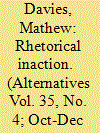

|
|
|
| 9 |
ID:
143896
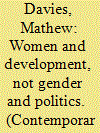

|
|
|
|
|
| Summary/Abstract |
While questions have been asked about whether ASEAN could, or even should, adopt the United Nation’s Women Peace and Security (WPS) agenda, this article is the first to ask why it has not done so already. ASEAN’s strong engagement with gender issues beyond the WPS agenda, together with the pressing need to address conflict and security concerns within Southeast Asia, make this an absence that requires an explanation. I argue that the usual explanatory framework deployed to account for ASEAN “not doing” something — the weaknesses caused by consensus, unanimity and the “ASEAN Way” — do not explain the absence of the WPS agenda; ASEAN’s engagement with gender is too advanced for the “it does not want to” explanation to hold. Instead, I locate the failure to engage with the WPS agenda in a particular elite understanding of women as both non-political and vehicles for the realization of economic and social well-being. This elite mindset, which both differs from that found within the ASEAN institutions dedicated to gender issues and which serves as the key driver of ASEAN’s institutional design, has retarded engagement with WPS because it stands at odds with the active political agency of women that WPS promotes. Revealing this reason for ASEAN’s failure to institutionalize WPS provides a way to consider the future of this important set of norms. I argue that efforts to mainstream WPS must take account of this ingrained framing of women as apolitical if they are to be successful.
|
|
|
|
|
|
|
|
|
|
|
|
|
|
|
|
|
|
|
|
|